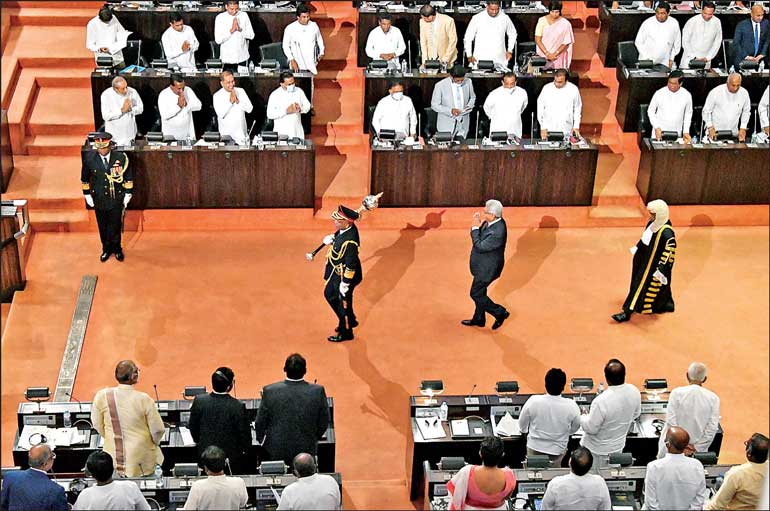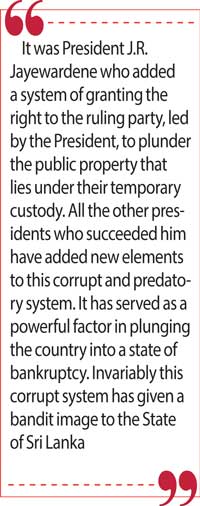Thursday Feb 12, 2026
Thursday Feb 12, 2026
Friday, 1 October 2021 00:00 - - {{hitsCtrl.values.hits}}

Sri Lanka as a country is now in a pathetic state which is extremely ugly and uncivilised. Sri Lanka is also the only country in the world to have had a Parliament consisting of MPs who are engaged in business transactions with the Government without facing any legal challenge – Pic by Shehan Gunasekara
I urge the President, the Chief Justice, the Leader of the Opposition, the Speaker of Parliament, the religious dignitaries and the people of the country to close their eyes, enter into a state of meditation for a moment, and visualise all aspects of the State of Sri Lanka, which perhaps may not be visible at a superficial glance.
visualise all aspects of the State of Sri Lanka, which perhaps may not be visible at a superficial glance.
I am sure that you will all be amazed by the spectacle that appears before your mind’s eye. Just a glimpse of this vision will suffice for you to realise that Sri Lanka as a country is now in a pathetic state which is extremely ugly and uncivilised.
At the top of the pyramid is the President. The nature of the position does not evoke a sense of respect except a feeling of ugliness. The President has been vested with all the powers in the state. The position has been deliberately designed to be above the law. Even the American President remains under the rule of law though he is acknowledged to be the most powerful president in the world. The American Judiciary has the power to annul any act that he commits contrary to the law. But the Judiciary of Sri Lanka does not have the power to annul any act of the President that violates the law.
The cost incurred in a Presidential Election by each candidate of the two major parties has been estimated to be around Rs. 3 billion or 3,000 million (for a period less than one-and-a-half-months only). There is no system in Sri Lanka to regulate Presidential Election funds or expenses of Presidential Elections. Such funds or expenditures are scrutinised in almost every country in the world; but it does not happen in Sri Lanka.
However, Sri Lanka had a system of strict scrutiny of election funds and expenditure until 1977. Following the establishment of the presidential system, regulation on election funding and expenditure control was abolished. Since then, elections have been held for 43 years without any regulation of election funds or expenditure. This fact alone will suffice to understand how inefficient and corrupt the Parliament in Sri Lanka is.
Predatory nature of the presidential system
The president gets elected to the office after swimming in an ocean of black money. The presidential candidates do not check whether the money received by way of donations for election expenses is well earned or clean money. When collecting donations, the highest importance is attached to the large amounts of money received, not the small amounts. The obligation for repayment of the funds received, by whatever form, will be more for large sums of money received and not the small amounts.
The drug traffickers are the prime source of big money. Perhaps, it could be the only avenue available for obtaining large sums amounting to Rs. 500 million or sometimes Rs. 1,000 million at once. The victorious presidents are invariably compelled to follow a policy of extending special patronage to such big supporters. Perhaps this must be the reason why the drug trade in Sri Lanka has become an uncontrollable menace.
large sums amounting to Rs. 500 million or sometimes Rs. 1,000 million at once. The victorious presidents are invariably compelled to follow a policy of extending special patronage to such big supporters. Perhaps this must be the reason why the drug trade in Sri Lanka has become an uncontrollable menace.
I asked Mangala when he was preparing himself for formulating an agenda containing the principles for a transformation as to why only Sri Lanka had not ventured to adopt a regulatory system for election funding and expenditure even after a long period of 42 years since the existing system was terminated. The answer he gave to my question was amazing.
“There are instances that the candidates running for the presidency from the two major parties receive twice as much as the cost of the Presidential Election. Sometimes, there are chances they receive even more. If the cost is three billion, there may be times they get six billion or more.”
Having said that, he gave an example that he knew. He remarked that “the funds received by the candidate are treated by both parties as belonging to the individual concerned and not to the party”. Consequently, “even a leading candidate who loses the Presidential Election has the potential to make a fortune and therefore the leaders of both major parties do not wish to see the situation changed,” he added.
This practice described by Mangala applies not only to presidential candidates but also to parliamentary candidates as well. Therefore, this situation has obviously led the Parliament to pursue a policy of avoiding legislation to regulate election funds and expenditure. This can also be considered as a good example of the selfish and corrupt nature of the Sri Lankan Parliament. It is to prevent the occurrence of such serious errors that any future exercise of adopting a new constitution for Sri Lanka should not be limited only to the parliamentarians. It was President J.R. Jayewardene who added a system of granting the right to the ruling party, led by the President, to plunder the public property that lies under their temporary custody. All the other presidents who succeeded him have added new elements to this corrupt and predatory system. It has served as a powerful factor in plunging the country into a state of bankruptcy. Invariably this corrupt system has given a bandit image to the State of Sri Lanka.
Parliament and the Judiciary
The Parliament of Sri Lanka can be considered as the only one of its type in the world in which the ruling party, including the President, has got the five-sixths majority commanded by it extended for another term through a corrupt referendum. Sri Lanka is also the only country in the world to have had a Parliament consisting of MPs who are engaged in business transactions with the Government without facing any legal challenge.
According to the law of the land, they are not allowed to do business with the Government. But a vast majority of MPs are engaged in business with the Government, contrary to the law. Yet, the law is not enforced against them. This is because the President has adopted a policy of protecting them by using the power of immunity which he is entitled to.
Both the Legislature and the Executive have ganged up together and broken the backbone of the Judiciary. On two occasions the Judiciary attempted to stand on its feet, but in each case the Executive and the Legislature ganged up and suppressed the Judiciary. Since then, the Judiciary has made up its mind to assume a humble role.
The human rights record of the country is in a very bad shape. This situation has rendered Sri Lanka a carnivorous image in addition to that of banditry. The amount of disrespect these ugly traits endemic to Sri Lanka have bequeathed to Sri Lankans living abroad is enormous.
If the rulers of the country are not prepared to bring about a change in this situation without further delay (the desired change can only be achieved by directing the country to a structural reform program), the people of the country as well as the expatriate Sri Lankans, Sinhalese, Tamils, Muslims and Burghers must get together and make a peaceful struggle conforming to the law and democratic principles to rectify the situation and improve the image of the country.